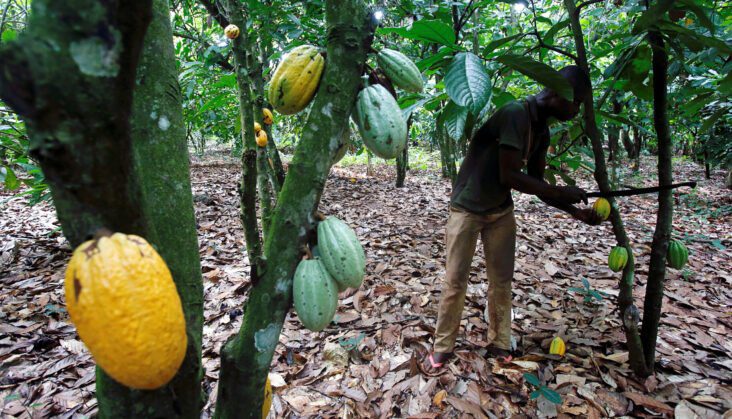Côte d’Ivoire and Ghana: Bitter About ‘Conspiracy to Undermine Farmers’ By Cocoa Traders
When Abidjan and Accra joined forces to create cocoa’s OPEC, also referred to as COPEC, they were looking to change the power balance in the cocoa sector. But the economic downturn had other plans.
The marketing year for the 2020/21 harvest season has gotten off to a very rough start in Côte d’Ivoire and Ghana, the world’s top two cocoa producers. Together they account for more than 70% of the supply sold on the market.
When the two west African neighbours created cocoa’s OPEC, also referred to as COPEC, in 2018, they sought to gain more influence over global prices and increase their share of the profit pie. Out of $100bn in yearly sales generated across the cocoa supply chain, barely 6% ends up in the hands of producing countries, while the farmers who create this wealth capture only 2% of this amount.
When Abidjan and Accra joined forces, they were looking to shake up the industry. But the economic downturn had other plans.
‘Inaccurate predictions about consumer demand’
Industry giants made inaccurate predictions about consumer demand for chocolate in the wake of the COVID-19 pandemic as lockdowns in Europe and the United States became the norm.
According to one chocolate maker: “With the lockdowns, we thought that chocolate consumption was going to explode because people would be at home all the time and have no other alternative to chocolate. Instead, we saw a decrease in consumption.”
Weak demand – and the corresponding drop in cocoa prices, which could fall to just £1,475 a tonne in London by the end of the year, according to analysts, or 17% lower than at the end of 2019 – has led industry majors like Cargill, Olam International and Sucden to call for the origin differential to be lowered. This premium, currently set at between £70 and £100 a tonne for Côte d’Ivoire, varies from one producing country to another.
But the most pressing dilemma is that the largest cocoa traders are now refusing to pay the living income differential (LID), fixed at $400 a tonne, for the current season.
At present, low prices have led chocolate makers to halt their purchases through global cocoa futures contracts, but this development has not stopped cocoa from being bought directly from producers or exported.
Is the LID a liability?
Established by the world’s top two cocoa producers as a way to increase farmers’ earnings, the LID has become a liability in the West African cocoa sector.
“Exporters pocket big cocoa premiums, while farmers get just a tiny fraction – around 30 to 60 CFA francs [between €0.04 and €0.05 per kilo] – of that. We created the LID to buck this trend,” says an Ivorian minister.
In Côte d’Ivoire, the income premium applies to approximately 300,000 tonnes of the main harvest this year. In Ghana, some 200,000 tonnes are impacted. If no agreement is reached, Côte d’Ivoire will no longer be able to maintain the farmgate price paid to producers, set at 1,000 CFA francs per kilo of cocoa beans over the 1 October to 31 March period.
Exporters are defending their position by pointing to weak demand. “We can hardly fill our order books. On top of low demand, the sustained decrease in global prices has compelled us to adjust our spending to survive,” says a regional head of a major Abidjan-based international cocoa sector player.
A ‘conspiracy to undermine farmers’
On 10 November, the two regulatory bodies behind COPEC, the Coffee and Cocoa Board (CCC) and the Ghana Cocoa Board (COCOBOD), convened an emergency meeting in Accra to look into and examine the point of contention.
Joseph Boahen Aidoo, the chief executive of COCOBOD, called out the major cocoa companies for not “playing fair” by reneging on their commitments. Yves Koné, the Ivorian boss of CCC, spoke of a “conspiracy to undermine farmers”.
“Multinational corporations don’t want to pay the LID and are trying to shield themselves behind the country differential. If they were actually encountering financial difficulties, they would stop buying cocoa altogether,” says Koné.
Pondering sanctions
In light of the dispute, Abidjan and Accra are preparing a series of sanctions. In addition to possible monetary penalties, the two sector regulators plan to suspend all ongoing cocoa sustainability and certification programmes.
These types of programmes involving supply chain traceability are crucial for cocoa majors. Before exporters can put their cocoa beans on the European or US market, they must provide proof that their product was not produced using child labour or in forest reserves.
If the Ivorian and Ghanaian authorities follow through on their threat, chocolate makers will be hard-pressed to find new suppliers, as the two west African countries together produce around 3 million tonnes of cocoa out of a global supply of 4.6 million tonnes.
It’s unclear in the short term the outcome following efforts led by COPEC and the world’s top two cocoa producers. Owing to the decline in cocoa processing in Europe, Asia and the United States in the wake of COVID-19, cocoa supply is greater than demand this year. As a result, industry majors can get by without west African output for the time being.
In the long run, however, the situation is much less clear. How long will this power struggle pitting producing countries against exporters go on? In any event, Abidjan and Accra remain open to proposals and negotiations, meaning that a deal could be on the horizon. If one does transpire, this vital sector for their economies will be spared the worst.
- Côte d’Ivoire and Ghana: Bitter About ‘Conspiracy to Undermine Farmers’ By Cocoa Traders - December 5, 2020
- Ghana And Côte d’Ivoire Taste Success In Raising Price Of Cocoa - September 10, 2020
